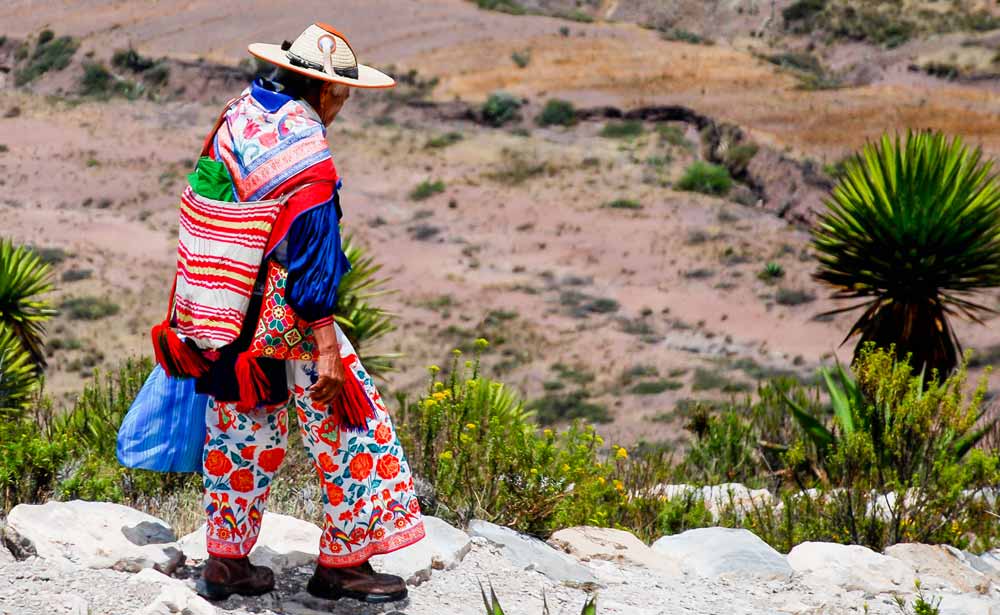Huichol Indians
City in Mexico
A Huichol Love Story
Meeting the Huichol Indians in Nayarit Opened “Mexico” Mike’s Eyes and Heart (a little)
This is a love story. Like love, it’s both uplifting and sad. You’ll write the end. I only do beginnings.

I’m not a parent. That’s good, I think. But it took a parent to explain why I care, why we can all care about a group of Indians called Huichols.
The Huichols live in Nayarit state. The Huichols are dying faster than they’re living. They create eye socket-shocking artwork that burns itself into your soul with bright blues, yellows and fierce reds in beadwork, yarn weavings, and more.
I’m no art critic. Nobody has ever accused me of being sensitive. I was more like W.C. Fields than Captain Kangaroo in my feelngs about children.
Even the hardest heart would know he was in the presence of something warm, kind and gentle if he met a Huichol. Julio Birrueta, convention manager of El Cid Resort in Mazatlán explained it to me. We were talking business when I felt an inner urging to open up to him C a feeling that disrupts what I think I want to do and pushes in a new direction.
I heard myself telling him about my visit to the Huichol Center for Cultural Survival in Santiago Ixcuintla, Nayarit. It’s 141 miles south of Mazatlán, then 5 miles west.
“Si,: he said “I have seen them. They are very orgulloso (proud) people.”
“They need somebody to care. The infant mortality rate is 50%.”
His stern businessman’s face dropped.
“Cincuenta! You mean one out of two babies dies?”
“Yeah. TB epidemic. Malnutrition. Famine. No clean drinking water.” I felt hopeless just telling him. Can you imagine being a parent there?
Julio looked beyond me and into the deepening twilight that crept into his office.
“I am a father,” he said simply. “I am a man. If I lose my arm, I will find a way to feed myself. But a child cannot take care of himself. We must protect the children. If not, we cannot call ourselves men, or human beings.”
Susana Eger Valadez, and her Huichol husband Mariano, hold the center together. She laughs often. Her voice is like her: sweetly alive, filled with hope, comforting, sincere.
“We’re here because they come to work the crops six months out of the year. When they get sick from the contagious diseases most of us are immunized for, it’s disastrous — especially if they go back to their homeland and contaminate the rest of the tribe. We’re trying to put a brake on the medical problems.”
The Center is a two story dark sand-colored house on the main street, across from a funeral parlor with a coffin above a beer sign.
“We are supported through the sale of artwork. There are no fees.” No bleeding-heart pushover, she adds, “My condition is that no one be idle while they’re here recuperating. The idea is to give them self-respect and pride in their work and their heritage.”
“As migrants, they aren’t treated at local hospitals. Their shamans admit there are outsider’s diseases they can’t treat. They combine traditional healing (herbs, prayer, shamans) and the miracles of modern men of medicine.
She came 20 years ago to get an anthropology doctorate. Now she’s raising consciousness and children. There are some things more important than degrees, though she got it later. She fell in love, with a man, with a people.
An Indian teacher, J. Krishnamurti writes better than I: “When you see a sharp stone on a path trodden by many bare feet, you remove it, not because you have been asked but because you feel for another… you may never meet. Without love there is no freedom; without love, freedom is merely an idea that has no value…”
On the way out, we went through Susana & Mariano’s bedroom.
“Nice VCR”, I said though I saw no TV. In fact, I didn’t see much at all, except a bed that sagged as much as my spirits on a really bad day.
“Yes,” Susana said her voice only a little less cheerful than usual, “I’ll miss it. We have to sell it to pay the food bill.”
I’m not the smartest guy to come from Edinburg High School, but I didn’t ask about the TV. I did what little I could to help. Not much. I bought something beautiful, but it pales compared to what she and the Huichols gave me.
Author’s note: This story was written in 1991. I was amazed at the response. Somehow people from all over the country saw it and started contacting me, offering to help. Among them was Stan Brock (one of my childhood heroes) of Mutual of Omaha’s Wild Kingdom fame. He’s involved with a charitable organization called Remote Area Medical in Knoxville, TN. He’d been planning to do something to help the Huichols and I was able to put him and Susana together. He brought a team of doctors and nurses to Santiago and did a lot of good. I watched and took pictures. Coincidentally, there was a great flood in the area. I hitched a ride on a helicopter and took pictures of the rescue efforts. The next day I filed my first hard news story with the Associated Press. Doing something nice often has unexpected benefits. Since then, Susana was honored by the Windstar Foundation in Aspen for her humanitarian work and for making the world a better place. That’s pretty prestigious company as Jacques Costeau is another recipient.
I helped convince Susana her that tourists would be glad to help if she opened the place up to sell handicrafts. She reluctantly agreed. Two years later, I stopped in to visit. Susana came out and hugged me. Proudly, she showed me the extra rooms that she was able to rent and use for her little hospital. She said the drivers who had stopped by had helped her get enough money to expand. I saw a Huichol family in one of the extra rooms. A little girl, while holding onto her mother’s skirt, reached her little hand out to me. This was unprecedented for a Huichol, or any other kid. They usually run and hide when they see me.
As I climbed back into my truck, I had a hard time seeing. The high humidity had fogged my glasses and my allergies made my eyes water. They cleared up when I hit the highway.
I had some wonderful pictures of the Huichols that I kept meaning to scan and put on this site. They were taken in the dark ages when I took slides. When my house burned down, I lost everything, but those slides of those sweet people were among the treasures I miss.


